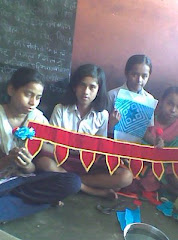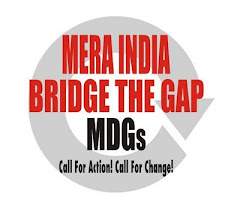Who am I going to vote for? The voting day is upon us and I have not been able to make up my mind. India’s problems are immense, the country is huge, its population is large. And governing it is no easy task. Granted. Over 60 years since Independence, and a substantial majority of Indians still go to bed hungry. Millions do not have a roof over their head that they can call home. Many more can’t read and write. But that is another story.
Here I wish to focus on my immediate neighbourhood in the capital city of Delhi and why it is so tough for me to find my leader.
I see corruption and callousness of the powers-that-be towards the common man. I see the power of money. It is used to bend the rule of the land, and in the bargain, the common man or woman is put through needless harassment of an unthinking system.
An example: Many buildings in my neighbourhood stand testimony to norms having been flouted, especially by the builders. Not only do they cover more than the stipulated area, they also rise much higher than what has been laid down.
If you want to buy a house, you will have to be really lucky to get one with a completion certificate; for most come without one. But the estate agent will assure you, “Don’t worry. You will not be harassed. Everything has been taken care of.” This means the pockets of those who matter have been adequately lined with money.
For decades people had encroached upon government land with impunity, added rooms and extensions not permissible by law, and operated commercial outfits from residential premises. Political masters chose to turn a blind eye, extracting money to let the matters rest. Even the poor cobbler on my street gave hafta (a sum of money paid every week) to the cops so that they would not drive him away from the pavement.
One day, the administration woke up. Some people were served demolition notices. Then the bulldozers arrived. I saw two brand new buildings that were being given the finishing touches being targeted. The builder of one building, and the owner of the other had deviated from the guidelines. Why did the municipal corporation pass the plan in the first place? And then why did it wait till the building was ready to take action?
But it had to act. Politicians of various hues had to score points. Delhi had to be made into a world- class city in time for the Commonwealth Games. So action had to be taken, or shown to have been taken. Some portions of the outer walls of the two buildings which faced the main road were knocked down. The way the bulldozer carefully selected where to hit, told a story of money having exchanged hands. The neighbourhood buzz had it that a few lakhs were given to the officers to be ‘considerate’, to inflict damage that could be rectified with the least possible expense.
The buildings stood with the holes for months. As if they were a testimony to an administration that acts. There was much hue and cry in the city. Many business establishments were shut down. Many people lost their jobs. People took out protest matches and went to court. The opposition made a din. Newspapers and television channels faithfully covered the demolitions. And then as happens in this land, things died down, just as suddenly.
The workers returned. Bricks were added to the gaping holes, a coat of plaster and a brush of paint and it looked as if nothing had ever happened. Only some people in the municipal corporation and their political masters got richer by a few lakhs.
The whole drama served no purpose. By the end of it no one was wiser. Who were the corrupt officers, who bended the rules and pocketed the money? We did not get to know. Would they ever be punished? Of course not. For then the corrupt politicians would be exposed. And the politician is a special breed, above the law.
Another example: I went vegetable shopping and parked my car in the same spot I have been parking over the past decade. Only, this time when I returned, my car was missing. A helpful soul announced: “Your car has been towed away!” Nonplussed, I headed for the police station. I was fined – Rs 600 for parking at a no-parking zone.
“There is no such board on the street. And I have been parking there for years,” I told the cop.
“Well, now you can’t park there,” he said.
“Where do I park then?”
“On the opposite side of the road.”
“When did you change the rule?” I ask.
“A week ago.”
“But I have seen no board announcing that,” I pleaded.
“We can’t be putting up boards on every street,” he retorted.
An old man arrived. Panting and puffing, he came looking for his car. Another Rs 600…and on it went. At least five persons paid up in the half an hour I spent there.
Who could I complain to at this arbitrary functioning of the police? Where is my neta?
Oh! Who do I vote for?
Wednesday, 22 April 2009
Subscribe to:
Post Comments (Atom)
.jpg)





+(2).jpg)


1 comment:
Wow! what a wonderful and very touching post.
You draw pictures through your works.
Keep up the great work.I'll visit you often for sure.
Post a Comment